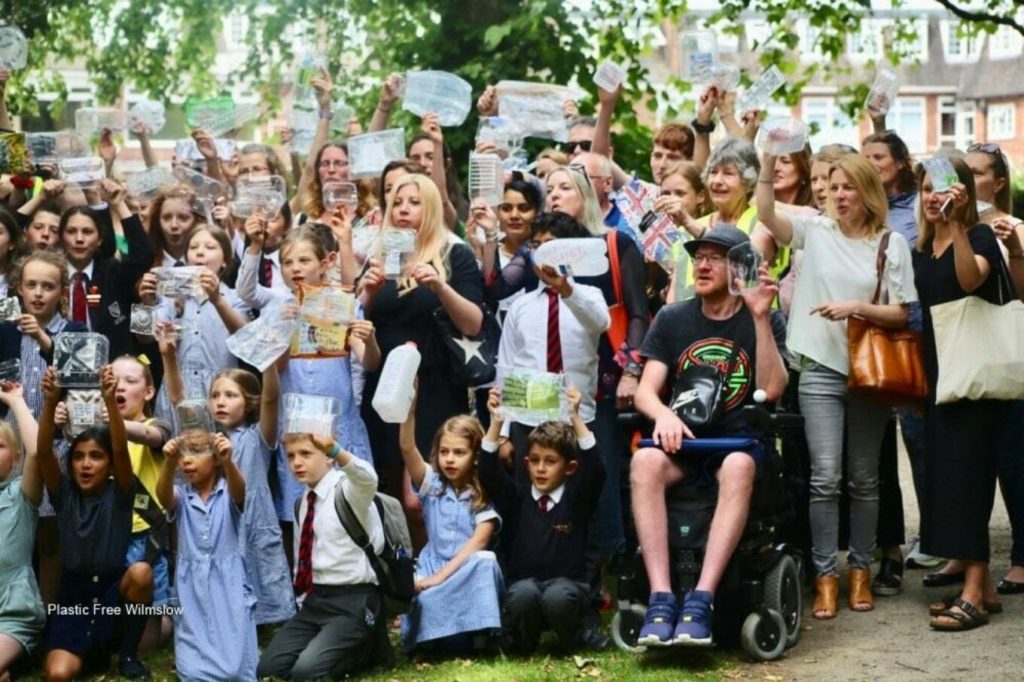With summer upon us and COVID-19 restrictions continuing to decrease, many people are looking towards outdoor community events and festivals as an opportunity to enjoy the weather and meet with friends. These events are important, as they are great economic drivers for municipalities and local business owners alike. However, there is one major problem with most events and festivals hosted in our cities– the plastic waste.

Credits to https://canprepp.ca/
When we think about the waste we encounter at such an event, we can think about the number of drinks we consume in the outdoor heat, we can think about how many new treats we purchase from different food vendors, and we can think about all the decorations and giveaways made available to us as event goers. Now how much of those interactions result in plastic waste? Almost all of them.
Everyone has seen the end result of an outdoor event. The overflowing garbage receptacles, litter spread across open fields, disposable plastics everywhere. In the UK, an estimated 3.17 million people attend outdoor music festivals each year, producing approximately 23,500 tonnes of waste. Around 30% of that waste is actually recycled. It is estimated that Montreal hosts over 5.9 million people at summer music festivals, producing roughly 23,500 to 45,000 tonnes of waste each year. Clearly, action is needed to address and reduce the waste from these community events.
Many Canadian municipalities host upwards of 100 major community events during the summer season with millions of attendees. While some event holders are taking individual action to try and reduce the plastic waste generated– banning plastic straws or styrofoam serviceware– but individual action does not tackle the problem as a whole. We think that municipal governments have a role and responsibility to set the standard for event holders in their region by establishing plastic-free events policy.


Municipal governments have the power to create plastic-free guidelines for event holders. The guidelines can start with prohibiting common single-use plastics at local events. We know that a federal ban on disposable plastic cutlery, straws, and serviceware is coming in the next year or so, but it is important that governments at every level take action as soon as possible to eliminate these items in their jurisdiction. In some cases, better material alternatives may be suggested. This could include wooden cutlery or fully compostable paper cups. Although some of these options are better than single-use plastics, we must acknowledge that replacing a disposable plastic with a disposable item made of another material will still generate waste. The same amount of waste will be produced, but better material alternatives will (hopefully) be diverted from landfills more effectively.
We see reusable systems as the best alternative to single-use plastic. Public events are a great opportunity to install reusable systems because all of the vendors are located in one centralized location within the boundaries of the event. This makes it easier to implement, for example, a reusable cup system across the entire event. Attendees can pay a small deposit on their first drink to receive their reusable cup and continue to exchange the cup for a new one with each drink, before returning the cup at the end of the event to receive their deposit back. Depending on the system, vendors can be responsible for washing the cups during the event or the cups can be collected and washed off-site. The same sort of system can be used for other serviceware, such as plates, bowls, other food containers, and metal cutlery. Each vendor can also be responsible for providing their own reusables or work with local non-governmental organizations (NGOs) to provide reusables, depending on what works best for those involved.
A shift away from disposables at events that see attendees purchase multiple drinks and plates of food is essential to addressing waste at the local level. For instance, if you attend a weekend food festival and buy 2 drinks and 2 plates of food (with two sets of disposable cutlery), you’ve produced 6 disposable waste items. If 20,000 people who attend the same event do the same, the event would produce 120,000 disposable items as waste. Reusables eliminate that waste entirely by using the serviceware over again.
Most reusable serviceware providers aim to reuse their product more than 500 times. When we look at the benefits of reusables, there is a breakeven point where the same amount of resources are utilized as its disposable counterpart. Every use beyond the breakeven point makes the reusable option the more sustainable option. For example, stainless steel cutlery breaks even with disposable plastic cutlery after only two uses. This means that for every time a stainless steel cutlery option is used beyond the second time, there is a net environmental benefit compared to disposables. The breakeven point can depend on the reusable material as well as how the material is washed, but it is clear that fewer resources are needed when items are reused over a lifetime of use compared to single-use.


Credits to https://kawarthanow.com/
Banning single-use plastics has become a popular policy choice for municipal governments across Canada and around the globe, and some are taking the extra step to ensure reusables are prioritized as the go-to alternative. In Yellowknife, Northwest Territories, the city co-sponsors the Sustainable Event Checklist. Although the checklist is not a formal policy, it is a great example of what mandates could be included in municipal single-use plastic-free policy to create positive change. The checklist requires that vendors use only reusable or compostable dishes, cups, and cutlery and avoid non-compostable items such as single use condiment packages and plastic straws. Local NGO, Ecology North, also provides a ‘Rent-a-Plate’ service for all events in the region.Additionally, Ajax, Ontario also recently adopted a policy to phase out unnecessary single-use plastics for all meetings, festivals and events by 2023. The ban applies to non-recyclable, single-use plastics including but not limited to serviceware, food packaging (e.g. condiment packets, and single-serve creamers and jams), grocery bags and Styrofoam materials.
It is so important that our local governments support the movement towards reusables. Municipalities carry the burden of waste management, and can make a difference by tackling problem areas where high volumes of plastic waste are produced. Your local government can adopt a policy to mandate single-use plastic-free public events, work collaboratively with event holders to and do their part to reduce plastic waste in your city. There are so many pathways to plastic waste reduction, and addressing problems at the local level first is a great way to kickstart the change. Reach out to your local government today and ask your councillors to adopt a single-use plastic-free events policy in your region.
